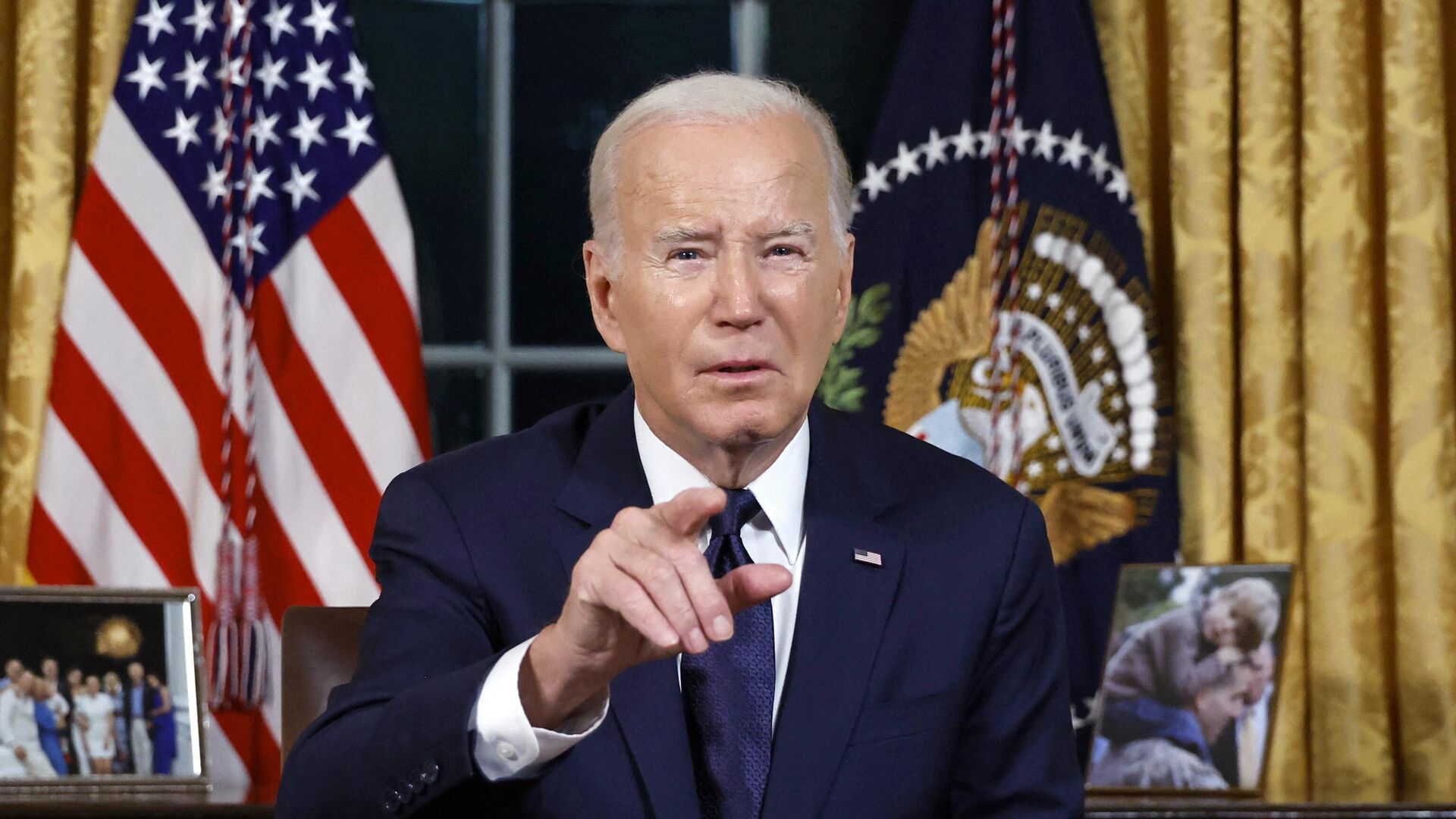https://sputniknews.in/20240126/from-pakistan-to-bangladesh-everywhere-in-south-asia-you-find-a-us-footprint-6334491.html
From Pakistan to Bangladesh, Everywhere in South Asia You Find a US Footprint
From Pakistan to Bangladesh, Everywhere in South Asia You Find a US Footprint
Sputnik India
In 2024, over 50 countries, including Pakistan, India, Sri Lanka, Taiwan, Bhutan, Indonesia, and Iran, are holding elections, making it a pivotal year in Asia... 26.01.2024, Sputnik India
2024-01-26T12:57+0530
2024-01-26T12:57+0530
2024-01-26T14:56+0530
sputnik exclusives
sheikh hasina
bangladesh
pakistan
india
imran khan
us
joe biden
pakistan tehreek-e-insaf (pti)
pentagon
https://cdn1.img.sputniknews.in/img/07e8/01/16/6290279_0:0:3072:1728_1920x0_80_0_0_bec3d138c7bcc4e57b9c9dcc757f01b8.jpg
Leaders, from Iran to Afghanistan, have all expressed protest over the American interference in Asian politics, internal affairs in pursue of regime change.Foreign Interference in South Asian ElectionsThe reasoning behind intervening in Asian politics is not only to install US-friendly governments: for Washington, it is also to contain Chinese influence in the region. "Despite the absence of direct interference from the United States in India, and no official complaints from India regarding such interference, other countries in the region, notably Pakistan and Bangladesh, have openly criticized the US involvement in their affairs," he adds.In the time of general election, and upheaval sitaution in Dhaka, the Awami League, the largest party in Bangladesh, has accused the Joe Biden administration of attempting to interfere in Dhaka's current election and of seeking to foment anarchy in the country.The Case of PakistanIn Pakistan, the leaders of the country's largest political party, PTI, have accused the US of interfering in Pakistani politics."This notion is largely held by the supporters of Imran Khan. All major political conspiracies and regime changes in Pakistan are largely attributed to outside interference. The US has been accused of bringing regime change to Pakistan when the elected government did not serve its interests. Since regime change does not happen with strong governments, a weak civilian government is always installed, as seen in Pakistan, even the most popular leader has no choice but to form a weak coalition government, making them vulnerable to a coup," he added."It has been proved now that US was behind regime change operation in Pakistan (it is not new US has been doing it for years) due to the removal of elected PM, Pakistan is going through one of the worst political turmoil of the history," she argued.US Pursues Neo-Colonial Practices to Encircle China in a Multipolar WorldSince the emergence of China, the US and its allies have been actively engaged in geo-political and geo-strategic efforts to counter China. Their primary objective involves pursuing regime change policies and supporting Pentagon-aligned governments in Asian countries to establish regional hegemony. This pursuit involves significant financial investments in political interference and manipulation.Moreover, he pointed, "A very common trend that is visible in Bangladesh and Pakistan is that they, unlike before, don't want to be cowed by the West and want to have multilateral engagement. Bangladesh's bid for BRICS membership and Pakistan's engagement with the SCO are quite visible examples of it. India, the bigger power among them, is also finely balancing its engagement with other countries independently, prioritising its national interest, which is visible from its engagements in BRICS and SCO on the one hand and the US-led anti-China military bloc named QUAD on the other."
https://sputniknews.in/20231229/did-the-us-have-a-secret-hand-in-imran-khans-ouster-5990032.html
bangladesh
pakistan
india
us
south asia
indo-pacific
russia
Sputnik India
feedback.hindi@sputniknews.com
+74956456601
MIA „Rossiya Segodnya“
2024
Muhammad Sharif
https://cdn1.img.sputniknews.in/img/07e7/0b/05/5257054_0:0:443:444_100x100_80_0_0_b8bd2af32be62a6eecdb4a84c7fd978f.jpg
Muhammad Sharif
https://cdn1.img.sputniknews.in/img/07e7/0b/05/5257054_0:0:443:444_100x100_80_0_0_b8bd2af32be62a6eecdb4a84c7fd978f.jpg
News
en_IN
Sputnik India
feedback.hindi@sputniknews.com
+74956456601
MIA „Rossiya Segodnya“
Sputnik India
feedback.hindi@sputniknews.com
+74956456601
MIA „Rossiya Segodnya“
Muhammad Sharif
https://cdn1.img.sputniknews.in/img/07e7/0b/05/5257054_0:0:443:444_100x100_80_0_0_b8bd2af32be62a6eecdb4a84c7fd978f.jpg
sheikh hasina, bangladesh, pakistan, india, imran khan, us, joe biden, pakistan tehreek-e-insaf (pti), pentagon, brics, shanghai cooperation organisation (sco), south asia, multipolar world, us hegemony, indo-pacific, quad, russia
sheikh hasina, bangladesh, pakistan, india, imran khan, us, joe biden, pakistan tehreek-e-insaf (pti), pentagon, brics, shanghai cooperation organisation (sco), south asia, multipolar world, us hegemony, indo-pacific, quad, russia
From Pakistan to Bangladesh, Everywhere in South Asia You Find a US Footprint
12:57 26.01.2024 (Updated: 14:56 26.01.2024) In 2024, over 50 countries, including Pakistan, India, Sri Lanka, Taiwan, Bhutan, Indonesia, and Iran, are holding elections, making it a pivotal year in Asia geopolitics. The outcomes of these elections will have a significant impact on global politics as well.
Leaders, from Iran to Afghanistan, have all expressed protest over the American interference in Asian politics, internal affairs in pursue of regime change.
Just two weeks ago, Bangladesh
held its general election amidst significant political turmoil and social chaos among political rivals. Despite these challenges,
Prime Minister Sheikh Hasina, a popular leader and the head of Awami League (AL), emerged victorious in the polls.
Within two weeks, Pakistan is set to hold its polls. The irony is that country's popular leader and chairperson of the Pakistan Tehreek-e-Insaf (PTI) party,
former prime minister Imran Khan is currently in jail and his party members are banned from contesting the election under the PTI's logo. Khan himself has attributed his imprisonment to pursuing an independent foreign policy -- which, apparently, Washington did not appreciate much.
Foreign Interference in South Asian Elections
The reasoning behind intervening in Asian politics is not only to install US-friendly governments: for Washington, it is also to contain Chinese influence in the region.
"The South Asian region is viewed by the United States and other Western nations through the prism of their quest for global dominance, particularly in light of strategic concerns about China. Their focus on the region's abundant resources, critical trade routes, and expansive market potential is instrumental in fulfilling their overarching objectives. Given China's prominent role in the region, the U.S. is keen on countering its influence, emphasizing the significance of having favorable governments in South Asia align with U.S. policies," Tawqeer Hussain, New Delhi-based journalist & geopolitical analyst told Sputnik.
"Despite the absence of direct interference from the United States in India, and no official complaints from India regarding such interference, other countries in the region, notably Pakistan and Bangladesh, have openly criticized the US involvement in their affairs," he adds.
In the time of general election, and upheaval sitaution in Dhaka, the Awami League, the largest party in Bangladesh, has accused the Joe Biden administration of attempting to interfere in Dhaka's current election and of
seeking to foment anarchy in the country.
"Former Pakistani PM Imran Khan has highlighted how the U.S. has often leveraged Pakistan to address its challenges. Recently, Bangladesh Prime Minister Sheikh Hasina expressed concerns about U.S. interference being undemocratic, posing a setback to the U.S. aspiration of maintaining positive relations in the region," Hussain said. "Despite global trends moving towards a multilateral arrangement, the United States continues to perceive itself as a global leader, persisting in its pursuit of dominance in the face of evolving geopolitical dynamics," Hussain concluded.
In Pakistan, the leaders of the country's largest political party, PTI, have accused the US of interfering in Pakistani politics.
"There is an official position on US interest in Pakistan's elections, contrary to the commonly held perception. Officially, the United States denies that it dictates the conduct of Pakistan's elections, insisting instead that it supports free and fair democratic process. A large segment of society believes that upcoming elections are pre-rigged. The reasons is that the largest political party, PTI, is being sidelined due to its leader's anti-American sentiments. Therefore, the perception is that the US is said to have put pressure on the Pakistani military to keep Imran Khan and his party out of politics, as his return to power could harm US interests in Pakistan," Naad-e-Ali Sulehria, a Berlin-based Researcher, Think tanker & South Asian analyst told Sputnik.
"This notion is largely held by the supporters of Imran Khan. All major political conspiracies and regime changes in Pakistan are largely attributed to outside interference. The US has been accused of bringing regime change to Pakistan when the elected government did not serve its interests. Since regime change does not happen with strong governments, a weak civilian government is always installed, as seen in Pakistan, even the most popular leader has no choice but to form a weak coalition government, making them vulnerable to a coup," he added.
"The South Asian region is marked by geopolitical issues and unresolved conflicts, attracting significant involvement from major powers. For instance, regarding US involvement in Pakistan, it's a sensitive issue, and the country's unique and complex political system is influenced by various factors, including US involvement, contributing to political instability," Dr Aamna Khan, a Qatar-Based political analyst, told Sputnik.
"It has been proved now that US was behind regime change operation in Pakistan (it is not new US has been doing it for years) due to the removal of elected PM, Pakistan is going through one of the worst political turmoil of the history," she argued.
US Pursues Neo-Colonial Practices to Encircle China in a Multipolar World
Since the emergence of China, the US and its allies have been actively engaged in geo-political and geo-strategic efforts to counter China. Their primary objective involves pursuing regime change policies and supporting Pentagon-aligned governments in Asian countries to establish regional hegemony. This pursuit involves significant financial investments in political interference and manipulation.
"The West, particularly the US, has always wanted governments aligned with its neo-colonial vision in Bangladesh, India and Pakistan. Behind this is the US agenda of militarily encircling China—something for which it continues to use India-China border conflict caused by a British-era contentious demarcation of territories—and its desire to control what the Pentagon calls the "Indo-Pacific" in which they are gradually including the crucial Bay of Bengal and Arabian Sea," Tanmoy Ibrahim, Delhi-based researcher and Geopolitical analyst told Sputnik.
Moreover, he pointed, "A very common trend that is visible in Bangladesh and Pakistan is that they, unlike before, don't want to be cowed by the West and want to have multilateral engagement.
Bangladesh's bid for BRICS membership and Pakistan's engagement with the SCO are quite visible examples of it. India, the bigger power among them, is also finely balancing its engagement with other countries independently, prioritising its national interest, which is visible from its engagements in BRICS and SCO on the one hand and the
US-led anti-China military bloc named QUAD on the other."
"The US seeks to influence the governments of Bangladesh, Pakistan, and India to advance its geopolitical agenda. It aims to oust governments friendly with China and Russia and install regimes aligned with its interests. The US has a history of interfering in the region's politics to further its own goals, including using influential figures to push a pro-Western narrative. The ultimate aim is to leverage the Indian subcontinent as a strategic asset in its rivalry with China and Russia," he concluded.



